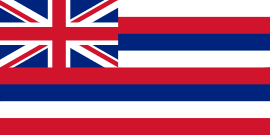E Ola Ke Alii Ke Akua
| English: God Save the King | |
|---|---|
 | |
|
National anthem of | |
| Lyrics | Lunalilo |
| Music | Same as God Save the Queen |
| Adopted | 1860 |
| Relinquished | 1866 |
.jpg)
E Ola Ke Aliʻi Ke Akua, translated as God Save the King, was one of Hawaii's four national anthems. It was composed in 1860 by Prince William Charles Lunalilo, who later became King Lunalilo. Prior to 1860, the Kingdom of Hawaii lacked its own national anthem and had used the British royal anthem God Save The King. A contest was sponsored in 1860 by Kamehameha IV, who wanted a song with Hawaiian lyrics set to the tune of the British anthem. The winning entry was written by the 25-year-old Lunalilo and was reputed to have been written in 20 minutes. Lunalilo was awarded 10 dollars, which later donated to the Queen's Hospital. His composition became Hawaii's first national anthem.[1][2][3] It remained Hawaii's national anthem until 1866, when it was replaced by Queen Liliʻuokalani's composition He Mele Lahui Hawaii.
E Ola Ke Aliʻi Ke Akua
| Ke Akua Mana Mau | Eternal, mighty God |
| Hoʻomaikaʻi, pōmaikaʻi | Bless us from your bright abode |
| I ka mōʻī | Our sovereign king |
| Kou lima mana mau | May your all powerful arm |
| Mālama kiaʻi mai | Ward from our sire all harm |
| Ko mākou nei mōʻī | Let no vile foe alarm |
| Ē ola ē | Long may he reign |
| Ka inoa kamahaʻo | Royal distinguished name |
| Lei nani o mākou | Our beauteous diadem |
| Ē ola ē | Long life be yours |
| Kou ʻēheu uhi mai | Thy wing spread over our land |
| Pale nā ʻino e | From every foe defend |
| Kā mākou pule no | To you our prayers ascend |
| Ē ola ē | Long live our king |
| I mua ou mākou | Before Thee |
| Ke aliʻi o nā Aliʻi | King of Kings |
| E aloha mai | Of Whom all nature sings |
| E mau ke ea ē | Our prayer we bring |
| ʻO ke aupuni nei | Oh let our kingdom live |
| E ola mau mākou | Life, peace and union give |
| Me ka mōʻī | Let all Thy care receive |
| Bless Thou our king[4] |
References
- ↑ "William Charles Lunalilo". HawaiiHistory.org. Retrieved 2010-03-07.
- ↑ "Hawaiian National Hymn". The Friend. March 2, 1874. Retrieved June 20, 2013.
- ↑ Smith, Emmerson C. (1956). "The History of Musical Development in Hawaii". Sixty-Fourth annual report of the Hawaiian Historical Society for the year 1955. Honolulu: Hawaiian Historical Society: 5–13. hdl:10524/59.
- ↑ English version by Makua Laiana. "E Ola Ke Ali'i Ke Akua". Hawaiian Music and Hula Archives. Kaiulani Kanoa-Martin. Retrieved 2009-10-06.
| Preceded by God Save The King |
National Anthem of the Kingdom of Hawaii 1860–1866 |
Succeeded by He Mele Lahui Hawaii |
